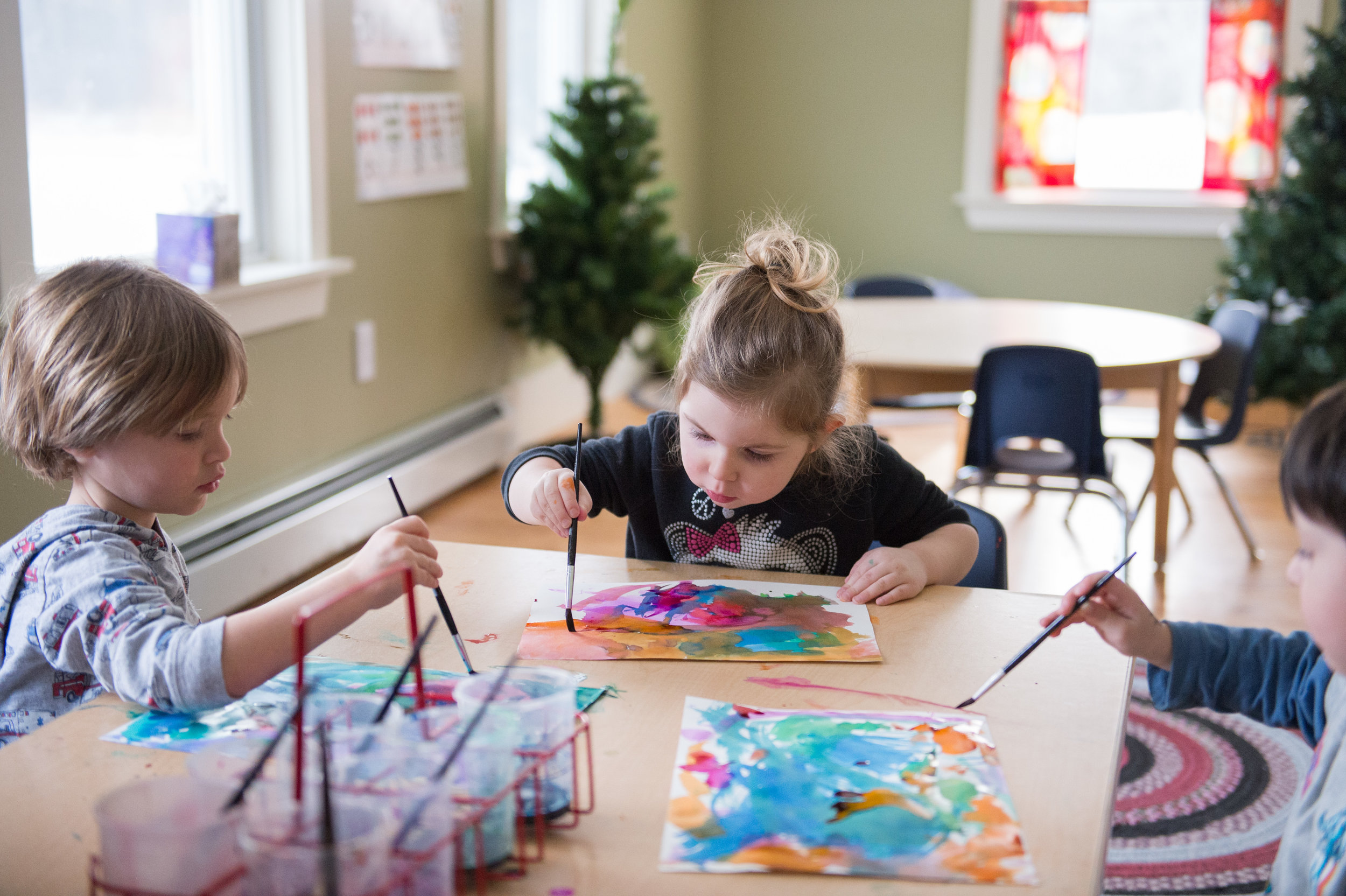Curriculum
Daily Schedules
Depending on the interests of children, monthly units of study and project work change annually. Cocoons is a dedicated supporter of the arts. Children dance, sing, paint and draw every day! In addition, every child performs in the annual I Love You Show to an audience of 300+ at the Kennebunk Town Hall…on stage! We are good!
Given that many children begin to attend Cocoons at age 2, the 1st and 2nd year Preschool Curriculum varies from the previous year. As your child progresses, units of study and skill development are more sophisticated; responsibilities on the farm increase.
_____
Toddler Program - Willow Room
The Willow Room at Cocoons is an age-appropriate Montessori based program. Children learn to use their words, share with friends, listen to books, follow directions, experiment with art, sing and dance, be introduced to the potty, and explore their environment both inside and out. Toddlers spend time outdoors daily where they play on the playground, take short walks, eat from the gardens and meadow, and visit the farm animals.
*Children must be at 2 years old by October 15th to enroll in the toddler program.
General Toddler Room Schedule
8:30 Creative Play
9:00 Circle Tme & Music
9:15 Wash Hands
9:30 Snack/Read Books
10:00 Project/Art
10:20 Diapers/Potty
10:45 Outside Time
11:30 Half Day Pickup
11:45 Diapers/Potty/Wash Hands
12:00 Lunch
12:30 Rest
2:00 Table Choices/Creative Play/Diapers/Potty
3:00 Aftercare with "big kids"
_____
1st Year Preschool Program -Cedar Room
In the Cedar Room first year preschoolers learn vital lessons for future academic success. Children learn to take care of their personal needs, to advocate using their words for both themselves and for others, to wait their turn, to follow directions, and to share time, “things” and their beloved teachers with peers, as well as to practice age-appropriate academic skills. Children who attend Cocoons during their first year of preschool are well prepared for the more academic structure of the 2nd year preschool classroom.
Morning
9:00-9:30 Morning Meeting – Music/I Spy (Calendar)/ Intro to Montessori jobs
9:30-9:50 ½ Montessori (Skill Project); ½ Creative Play
9:50-10:20 Bathroom & Snack
10:20-10:30 Wiggle Song & Story
10:30-10:50 ½ Montessori (Skill Project); ½ Creative Play
10:50-11:10 Bathroom & Get Dressed for Outside
11:10-12:00 Outside Time: Barn T/W; Meadow TH/F
Afternoon
12:00-12:30 Continue to Play Outside
12:30-1:00 Transition inside to wash hands & eat lunch with teachers
1:00-1:30 Set up rest “stuff” and read a story on the rug
1:30 -2:30 Rest with books and snuggle stuff
2:30-3:00 Begin to get up and play with free choice manipulatives (After Care Begins)
_____
2nd Year Preschool Program - The Birch Room
In the Birch Room teachers structure the curriculum to not only addresses the ever-more demanding academic demands put on kindergarteners, but to also maintain a fun-filled atmosphere which allows time for children to construct their world both outside and in the barn. The Birch Room is both center based and Montessori based. Understanding that parents typically only hear bits and pieces of what goes on during their child’s day, we are VERY anxious to share how we structure our 2nd year preschool curriculum!
Every Month Centers Will Be Constructed in the Birch Room based on the Monthly Theme
The Centers Include:
1. Phonemic Awareness- Becoming aware of different letter sounds & letters
2. Mathematic Awareness- Understanding numerals, 1-to-1 correspondence, and number sense
3. Creative Play-Encouraging children to use their imaginations & cooperative play skills
4. Construction -Encouraging children to construct and assess their world through concrete manipulation
5. Literary Awareness-Encouraging story telling, sequencing, and predicting, through the use of props, etc.
6. Project work- Practicing basic skills like using pincher fingers, scissors, glue sticks, painting, etc.
7. Computer Exploration-Assessing children according to their strengths & weaknesses. Children will use appropriate computer “games” to address their individual skills.
8. Science Exploration-Encouraging children to measure, mix, predict, and observe.
All children will visit centers during the month. When not involved with Montessori “work”, children will work in the centers for at least 30 minutes a day. (Obviously children who attend school more days in the week will be exposed to more of this work.) Every child will also participate in circle time, enjoy theme based stories, and participate in music, snack, and outside/barn time daily.



